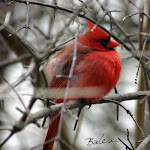
At this time of the year, Sheila gets a lot of phone calls at the front desk. Many of the callers ask questions like:
“I found a baby bird, do you want it?” or “I’ve got a baby robin, it’s fallen out of its nest, how do I raise it?”
Last Saturday we arrived at work to find a basket with baby birds inside. No note. Nothing. A trio of orphans set adrift like Moses in the bulrushes times three. In this case, staff member Kara Remington played the role of the Pharaoh's daughter.
As Ijams veterinarian Dr. Louise Conrad says, “Unless you find the bloody dead parent, don’t assume it’s an orphan.”
Baby birds are fidgety; they often fall or get pushed from their nest. The parents are well aware of where they are but cannot retrieve them. But they continue to bring food to the nestlings. They’re good parents. When their wings develop, the young bird flies to rejoin its family.
Dr. Conrad says that research also shows that if something does happen to the parent birds and the young are truly orphaned, other parent birds of the same species will often bring food to the calling orphan. In other words, an adult robin may respond to the food call and bring food to an orphan of its own kind.
Baby birds need to be fed several times an hour. They grow very quickly. It’s a difficult task for a human; besides, we cannot teach a wild robin how to be a wild robin. It is also against state and federal laws to adopt a baby bird as a pet.
Wild animals need to remain wild. Nature finds a way. In this case, doing the right thing means leaving them alone.
•



































































2 comments:
leaving them alone... that doesn't sound very good to me... They are too cute to be left alone.
That's good advice. I didn't know that.
Post a Comment